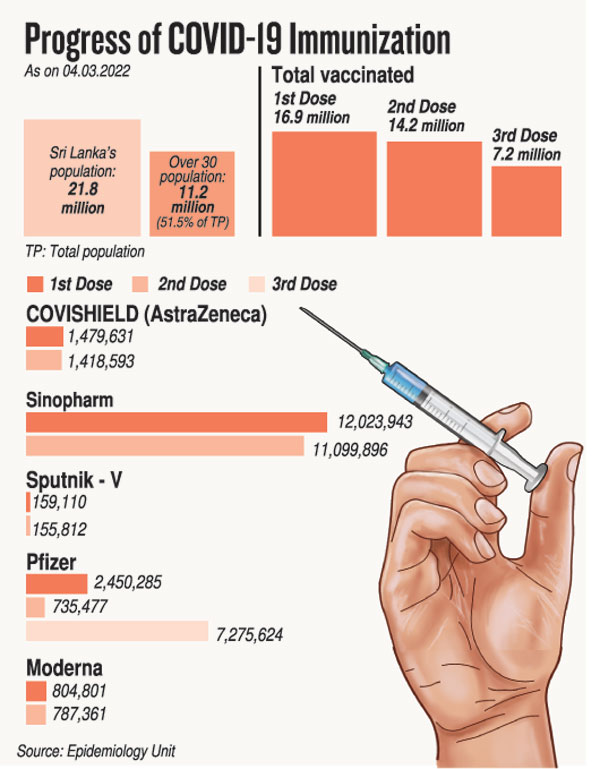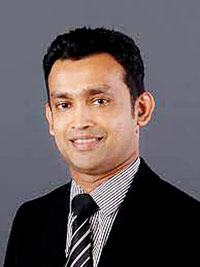News
‘Strong & clear game-plan needed to overcome vaccination hesitancy’
Vaccine hesitancy is the hot topic of the day in Sri Lanka when so many millions of doses are freely available in the country.
There are several reasons for people not taking their vaccines, said Consultant Respiratory Physician Dr. Neranjan Dissanayake who chats to all patients who seek treatment at his clinics and his ward at the Ratnapura Teaching Hospital.
 He reiterates that any strategy to overcome vaccine hesitancy should be clear-cut and targeted, addressing the concerns of people in a simple but factual manner. An important step towards reducing misconceptions is to investigate the reported side-effects thoroughly in a scientific way and alleviate fears.
He reiterates that any strategy to overcome vaccine hesitancy should be clear-cut and targeted, addressing the concerns of people in a simple but factual manner. An important step towards reducing misconceptions is to investigate the reported side-effects thoroughly in a scientific way and alleviate fears.
Some of the concerns mentioned to him by people who remain unvaccinated are:
Many people are still not fully aware of the benefits they would accrue from becoming fully vaccinated (1st and 2nd doses and also the booster or the 3rd dose). They have not comprehended the fact that vaccines against COVID-19 do reduce severe disease and death, especially in vulnerable groups. They do not know that these vulnerable groups can face death and severe disease even if infected by the so-called mild Omicron variant.
Dr. Dissanayake says that they simply do not understand the gravity of being unvaccinated. Some younger patients have got themselves vaccinated but have not given the jabs to their elderly relatives.
From his interactions with patients, he has found that the vaccine uptake is better among the rural people than the semi-urban and urban population. He says that it is distressing that educated people in society are more hesitant in getting themselves and their loved ones vaccinated.
Another important factor is that whether it is a vaccine, medication or medical intervention, there could be side-effects. As such, what we need to consider is the risk-benefit ratio.
If there is vaccine hesitancy, we must think:
What happens if I am unvaccinated and I get COVID-19? – I could get severe disease and die.
What happens if I am vaccinated and get a few side-effects? Then if I get COVID-19, it will be mild disease, I will not get severe disease which will send me to hospital and I will not die.
Vaccination against COVID-19 has been proven, according to worldwide studies, to prevent severe disease and death. This obviously is a positive impact that vaccination would have on family, society and the country.
Some of Dr. Dissanayake’s patients have attributed an increase of previous ailments such as wheezing to vaccination. However, when he takes a detailed case history, he has found that the vaccine had been taken more than a month before and the patient had not been taking his/her regular medications for the previous ailment.
In a small neighbourhood or village, though, if such a story goes around that hathiya wediwuna (panting increased), there would be a reluctance among the people in that area or village to take the vaccine.
Another major factor is that people are confused as to when they should take their vaccine doses.
The Health Ministry has specified that ‘Fully vaccinated’ for the eligible category (20 years and above) means that a person has taken two doses of a recommended COVID-19 vaccine and has completed 2 weeks after the second dose. The ‘fully vaccinated status’ will be valid for 3 months from the second dose.

Dr. Neranjan Dissanayake
After 3 months of the second dose, a person is considered ‘fully vaccinated’, only if the booster (3rd dose) is taken.
If infected with COVID-19 after being vaccinated with two doses, the booster can be taken after 1 month of the infection, provided the person has completed 3 months after the 2nd dose.
Some people also do not know where they can get the vaccines – where they should go, to get the vaccine. When they hear that vaccination has taken place in their area when they were not at home, they are puzzled as to what to do. They also have to work to earn their living and so the need to get the jab is put off.
Meanwhile, due to misunderstanding certain vaccine providers, there is a hesitancy in vaccinating those with mild food allergies, wheezing and co-morbidities and also those who are pregnant.
Dr. Dissanayake also laments that in some communities, vaccine penetration of the 3rd dose is quite low, not even reaching 20%. Therefore, a special focus needs to be cast at these areas.
This Respiratory Physician reiterates a very relevant point when he requests people to look at healthcare workers – “we represent Sri Lankan society in every way, be it age (over 20 years); different races; different religions; being healthy; being obese or not; having co-morbidities; and leading or not leading healthy lifestyles. You say it and it is there among us”.
In the first wave, before vaccination, many healthcare workers had severe disease and regrettably some of them died. But after the vaccination rollout, the number hit by severe disease was negligible, he says, adding that people should follow in the footsteps of healthcare workers and prudently get themselves fully vaccinated.
| ‘No need of full check-ups or a battery of tests’ COVID-19 has made people very vulnerable in more ways than one, cautions Consultant Respiratory Physician Dr. Neranjan Dissanayake, requesting individuals and institutions not to fleece or exploit these people. Fearful of disease and death, these people ‘drowning’ in COVID-19, will cling to any ‘straw’ and fall ‘prey’ to unscrupulous individuals and institutions, he says. Dr. Dissanayake says: “Whether it is a paniya (syrup), a food supplement, a herbal preparation or a drug that is not sanctioned, don’t tout it among people as a cure for COVID-19. “Unnecessary or irrelevant laboratory tests and imaging (CTs and scans) or detailed health check-ups are also not needed after you have recovered from COVID-19. For a lot of people, there is no significant problem and these are not needed and will cause unnecessary financial burdens to people who are already facing economic and psychological hardships. “If you still feel ill after recovery from COVID-19, see your doctor and get advice. He/she will suggest relevant investigations if necessary that would help to identify complications.”
| |
| Rule out COVID, as dengue, rat fever and flu are also doing the rounds There are many diseases with similar symptoms doing the rounds in the country, says Consultant Physician Dr. Neranjan Dissanayake, urging people to firstly take a test (either rapid antigen or RT-PCR) to confirm whether it is COVID-19. Or else, they should assume that it is COVID-19 until proven otherwise. The symptoms are: Fever Upper respiratory issues – nasal congestion; stuffy nose, runny nose, sneezing and also a cough Body aches and pains and less commonly loose stools (diarrhoea) “Don’t neglect these symptoms, assuming they are part of a simple viral fever saying mata virus unak heduna,” he points out, giving reasons why they should suspect COVID-19. According to him, “yes” it is a virus but if you have not confirmed that it is, you will be in your home without a face mask or isolating yourself. This will endanger everyone else at home especially high-risk groups such as the elderly or those with serious co-morbidities. Those with renal (kidney) disease; uncontrolled diabetes; cardiovascular disease and also immune-compromised conditions such as cancer are in danger if they are exposed to COVID-19. Without knowing that it is COVID-19, you will also go about your work, moving freely and spreading the virus, he says, stressing that it is better to suspect COVID-19 and take precautions. Dr. Dissanayake adds: “Symptoms such as fever and body aches and pains can also occur in conditions such as dengue, rat fever (leptospirosis) and influenza. Hence, it is vital not to neglect these symptoms but seek medical help to rule out these conditions.” |
The best way to say that you found the home of your dreams is by finding it on Hitad.lk. We have listings for apartments for sale or rent in Sri Lanka, no matter what locale you're looking for! Whether you live in Colombo, Galle, Kandy, Matara, Jaffna and more - we've got them all!

